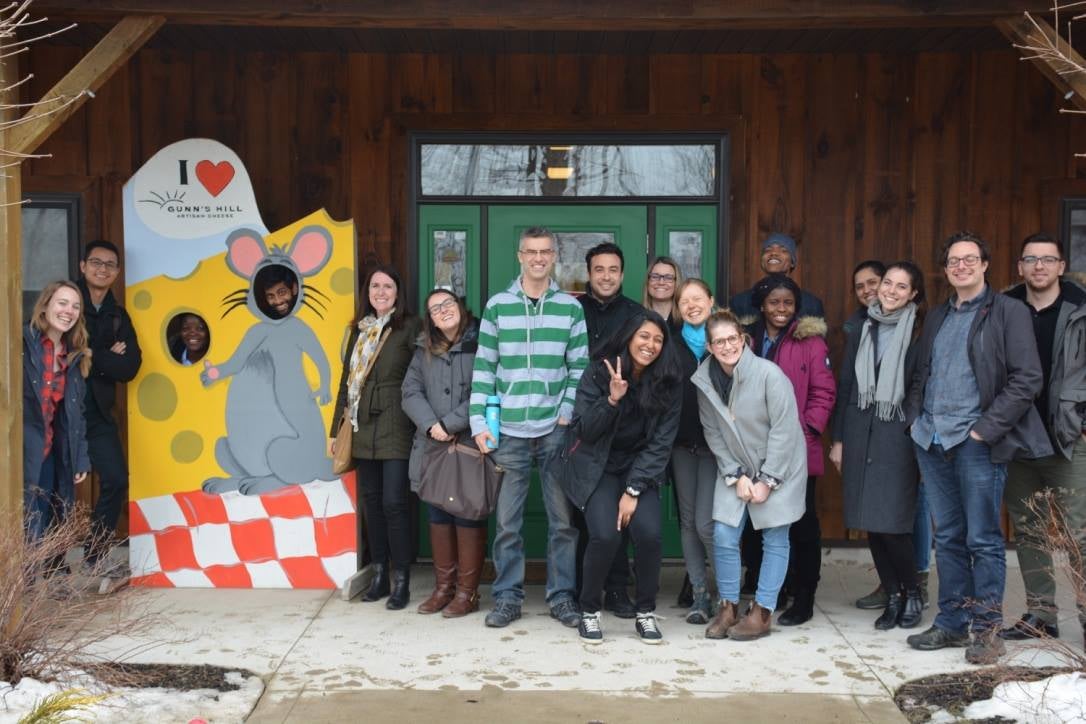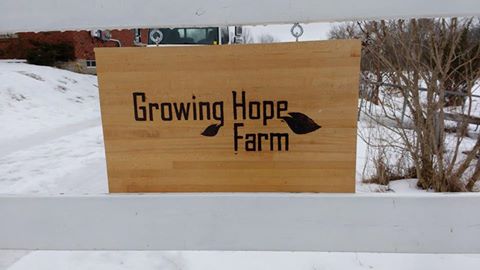
MEDI Student class photo on a recent trip to Oxford County to visit local entrepreneurs.
ECDEV 605 is a fresh learning experience within the Master of Economic Development and Innovation program that personifies experiential learning at the University of Waterloo. The newly re-imagined course was developed and run by Dr. Heather Hall, who specializes in innovation and regional development. 14 students had the opportunity to understand the realities of starting and managing specific elements of a business in Waterloo Region. Each student was paired with an entrepreneur who has an active startup within Velocity, St. Paul’s Greenhouse or Kindred Centre for Peace Advancement to develop business development mentorship skills. The focus for Dr. Hall was an immersive experience for the students, "I wanted the students to experience what it’s like to be an entrepreneur trying to find and apply for funding opportunities. By going through it themselves, they now understand first-hand that applications can be quite time-consuming, which will help them in the future when they are on the other side of the job, promoting grants or helping small companies access them."
The bulk of the course was focused on identifying and applying for a funding opportunity specific to that startup’s needs. Drawing on in-house expertise, Brendan Wylie-Toal GreenHouse Program Manager and Startup Coach ran a grant writing workshop for the students, and it was instrumental in setting the students up for success. Alison and Evelyn were students in the course and both had positive experiences:
After the course was done, my perspective really changed. I thought that the process was less complex, but after completing the grant application I realized that before you can access a grant often there is a screening process, then the grant writing itself is often a lengthy process depending on your application. In order to be successful you need to know how to properly write a grant application to get the administrator’s attention. I cannot imagine how overwhelming this process could be for entrepreneurs who have less time to dedicate to this task.
– Alison Earls, MEDI graduate candidate, 2017
I used to work at a volunteer organization, so I have completed a few funding applications. However, I wasn’t the one choosing the applications or doing the groundwork and calling people up. The funding application for the course however was different. I had to go and get information, I had to meet the entrepreneur, I had to find the funding that they were interested in applying for. It is not like any funding can work, you have to find the funding that fits your organization, not the other way around. So that was interesting.
- Evelyn Lovely Paul, MEDI graduate candidate, 2017
The students learned a lot throughout the term: the importance of face-to-face interactions and making meaningful connections in relationships; the high level of difficulty in managing all the competing priorities in a startup environment; and getting good at lots of aspects of the business through strong mentorship and training. Lorenzo Gonzalez took the course and had the opportunity to work with Sarah Martin Mills who started Growing Hope Farm, a social enterprise Farm that provides employment and training for at-risk youth in Cambridge, Ontario.

Sarah Martin Mills started and runs Growing Hope Farm
“Sarah is a member of the Epp Peace Incubator at Conrad Grebel University College and I found it was super easy to work with her because she had a well-crafted business plan and had done extensive market research. It was obvious that she had received great advice and was being mentored by good management. Additionally, Conrad Grebel allowed her to use their non-profit status which was necessary for Growing Hope Farm to qualify for community grants.”
- Lorenzo Gonzalez MEDI Graduate Candidate, 2017
The goal of the University Experiential Learning pillar is that learning from a course like this can set up a strong foundation and important viewpoint when MEDI grads enter the workforce.
“My career aspirations for after this course is complete is to be a local economic developer at the community level. This course was useful as it gave me a better understanding of some of the problems that local businesses in my community could have, which may help me to better address their needs in the future."
- Alison Earls, MEDI Graduate Candidate, 2017
Did this course add real value for the students? Evelyn Paul thinks so; “At the end of the day, the funding proposal project didn’t feel like an assignment as you get invested in it! Interacting with the entrepreneurs shows how passionate they are about their organization and you feel like it’s your responsibility to get them the correct funding and do your best.”
You can contact Dr. Heather Hall if you’re interested in learning more about how to get involved in the course.
Here is a list of all participating Startup Companies:
The Landmine Boys
Sesame